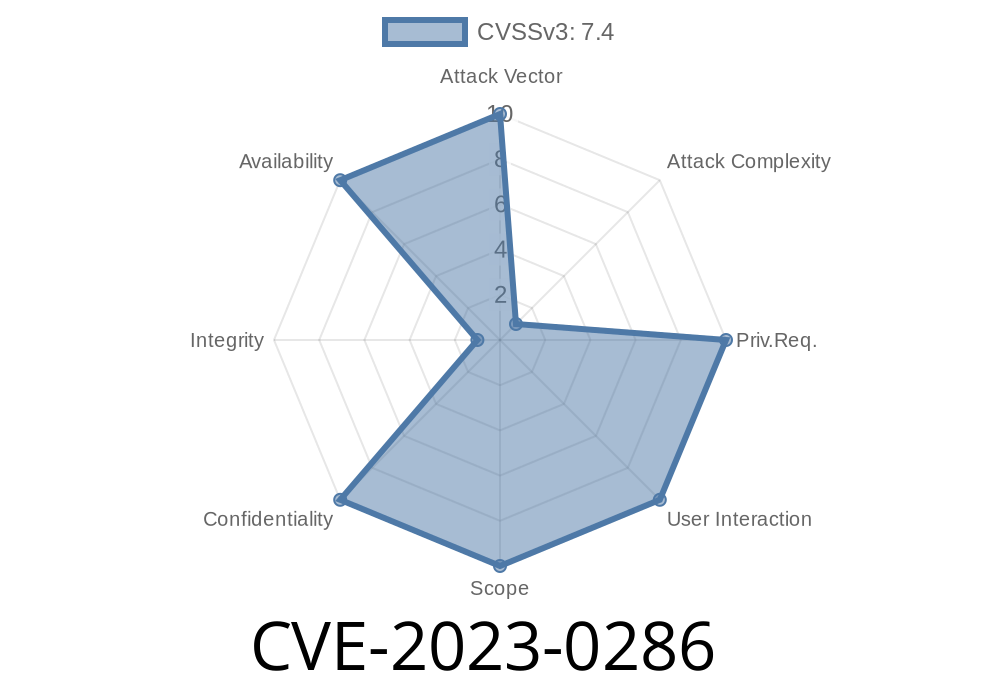Earlier this year, a critical vulnerability was discovered in OpenSSL—a cornerstone cryptography library used worldwide for secure communication. CVE-2023-0286 affects the way X.400 addresses are handled inside X.509 certificates, specifically due to a type confusion bug. This post explains the bug in simple language, shows how an attack works, and provides guidance for developers.
What is CVE-2023-0286?
CVE-2023-0286 is a type confusion vulnerability in OpenSSL, caused by how it processes X.400 addresses in the GeneralName field of an X.509 certificate.
- X.400 addresses aren’t commonly seen, but are one method for specifying distribution points for Certificate Revocation Lists (CRLs).
- The OpenSSL code parses the x400Address as an ASN1_STRING, but its public structure incorrectly expects it to be an ASN1_TYPE. This mismatch leads to dangerous memory manipulation when these objects are compared.
Here’s how GENERAL_NAME is defined in OpenSSL (simplified for clarity)
typedef struct GENERAL_NAME_st {
int type;
union {
ASN1_OCTET_STRING* otherName;
ASN1_IA5STRING* rfc822Name;
ASN1_STRING* x400Address; // Internally initialized as ASN1_STRING
ASN1_TYPE* directoryName;
...
} d;
} GENERAL_NAME;
But in the public header, the x400Address field was specified as ASN1_TYPE*, which is incorrect:
// Incorrect - in public header
ASN1_TYPE* x400Address; // Should be ASN1_STRING*
This mismatch becomes hazardous in comparison functions, like GENERAL_NAME_cmp, where the library expects an ASN1_TYPE, but gets an ASN1_STRING instead.
How Does the Exploit Work?
1. Crafted Certificate and CRL: An attacker can create both a malicious X.509 certificate and a matching CRL (certificate revocation list).
2. Type Confusion: The attacker inserts an X.400 address in these objects. When OpenSSL tries to compare the objects (as part of CRL checking), the type confusion causes the code to interpret a ASN1_STRING as a ASN1_TYPE.
3. Unsafe Memory Read: The function eventually calls memcmp() on invalid pointers (often attacker-controlled data).
Crash the process (DoS)
CRL Checking Enabled: The application must have X509_V_FLAG_CRL_CHECK turned on.
- Attacker Control of Certificate and CRL: Usually, the attacker must control *both*, and can submit both to the application (e.g., via a custom TLS handshake or bespoke PKI system).
- No Need for Valid Signature: The attacker’s certificate and CRL do not need valid signatures—just the structures themselves.
Let’s look at a key part of the vulnerable logic
int GENERAL_NAME_cmp(const GENERAL_NAME *a, const GENERAL_NAME *b) {
// ... logic to match 'type' fields ...
if (a->type == GEN_X400) {
// BAD: Interpreted as ASN1_TYPE*, but in memory is ASN1_STRING*
return ASN1_TYPE_cmp(a->d.x400Address, b->d.x400Address);
}
// ...
}
ASN1_TYPE_cmp might try to access fields not present in an ASN1_STRING, causing invalid memory access.
Below is a simplified C snippet showing what could go wrong
// Imagine a->d.x400Address is actually an ASN1_STRING*, not ASN1_TYPE*
int ASN1_TYPE_cmp(ASN1_TYPE *a, ASN1_TYPE *b) {
// Access fields assuming correct type
if (a->type != b->type)
return 1;
// Compares data using memcmp, but pointers are not what they appear!
return memcmp(a->value.ptr, b->value.ptr, ...);
}
With wrong types, a->value.ptr might point to attacker-controlled memory. By crafting the ASN.1 data, an attacker could control what’s passed to memcmp—including where in process memory to read from.
Real-World Impact
- Most Applications Safe: If you fetch CRLs automatically from the network, and do not parse attacker-supplied inputs, you're probably safe.
You let users supply both certificates and (unsigned) CRLs directly.
- Custom PKI/parsing code using OpenSSL with CRL checking enabled.
Official References
- OpenSSL Security Advisory: 2023-02-07
- NVD Entry for CVE-2023-0286
- OpenSSL X.400 address parsing code
Mitigation
- Upgrade OpenSSL: Fixed in OpenSSL 3..8, 1.1.1t, and later. See download page
Do not allow attacker-supplied CRLs: Restrict the source of CRLs.
- Validate Certificates Strictly: Ensure only trusted, signed certificate chains and CRLs are accepted.
Summary
CVE-2023-0286 is a classic example of a low-level bug in a widely-used cryptographic library that can have outsize impact—if circumstances align. While the requirement for the attacker to supply both certificate and CRL makes this unlikely in most scenarios, the potential for memory leaks or service outages means it’s wise to patch as soon as possible.
Stay safe—always keep your dependencies up to date!
Timeline
Published on: 02/08/2023 20:15:00 UTC
Last modified on: 03/27/2023 19:15:00 UTC
